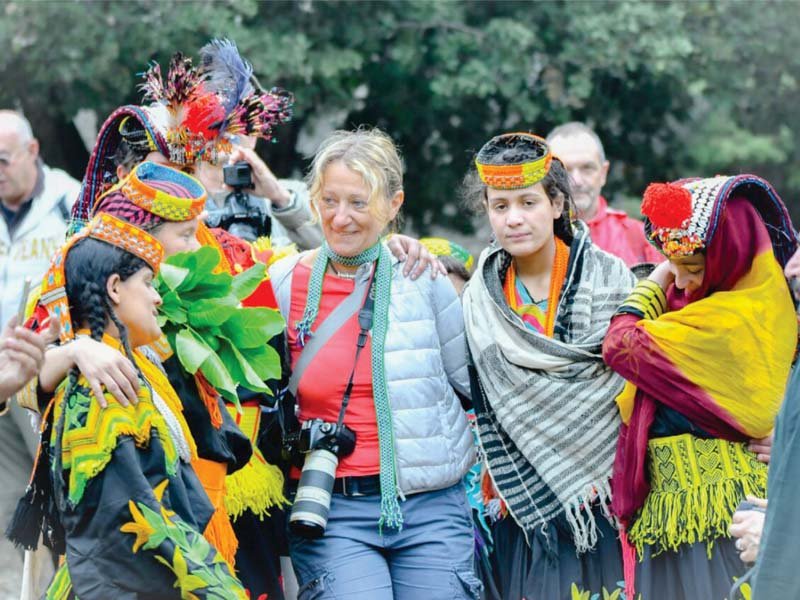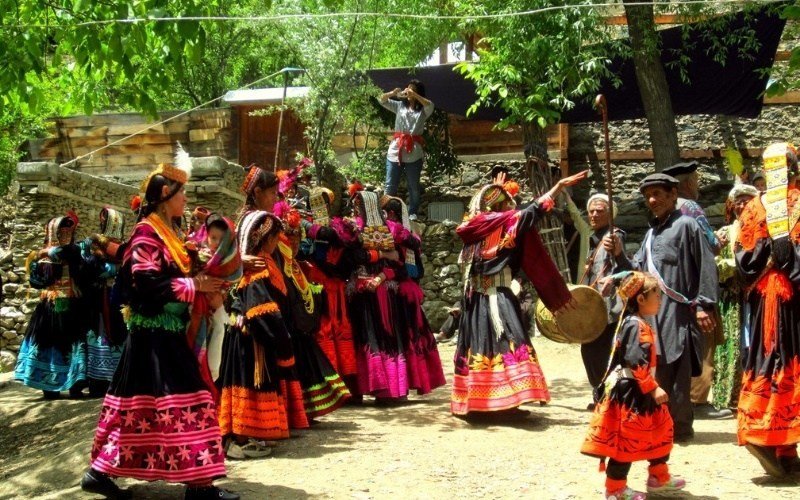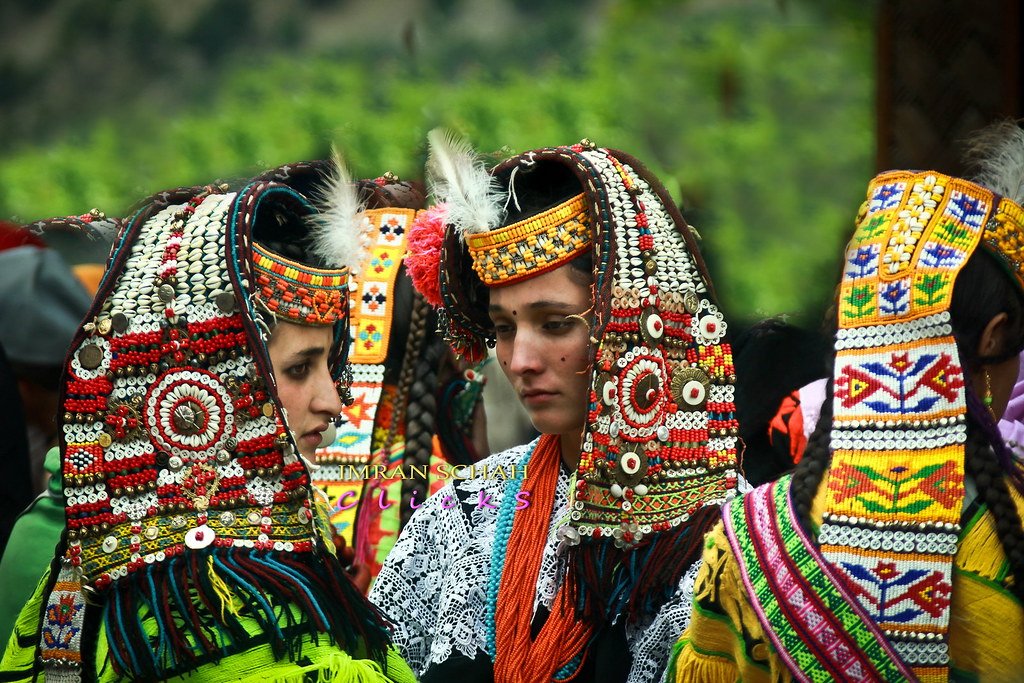Last year over 17,000 tourists flocked to Kalash valley which is comprised of three valleys with 4,000 population.
Herald Report
 In remote Kalash valley of Chitral, the Kalash minority community has preserved their unique culture, traditions, and lifestyle in the face of growing threats from external intrusion and coercion.
In remote Kalash valley of Chitral, the Kalash minority community has preserved their unique culture, traditions, and lifestyle in the face of growing threats from external intrusion and coercion.
Kalasha, a primitive pagan tribe, have a unique religion, culture, rituals and traditions.
According to a legend Sulfurous, a Greek general with five soldiers settled in Chitral and are the progenitors of the Kalash.
 Over 4,000 Kalashas live in three villages nestled in Kalash Valley in the northwest of Chitral in Pakhtunkhwa, says Luke Rehmat, a Kalasha journalist and rights activist.
Over 4,000 Kalashas live in three villages nestled in Kalash Valley in the northwest of Chitral in Pakhtunkhwa, says Luke Rehmat, a Kalasha journalist and rights activist.
They live a commune-like life and celebrate various festivals throughout the year. But there are three festivals Chilum Joshi in spring season, Uchal festival is celebrated in autumn and Choimos festival in mid-winters — which have significant role in their life.
But the influx of photo-snapping tourists have upset many.
Locals say an influx of mostly male, camera-wielding visitors is threatening their unique traditions.
The remoteness of these valleys once guaranteed their isolation. But last year 17,000 tourists mostly locals flocked to the valley.
Joshi Festival
Chilam Joshi, or spring festival is the most important of the festivals that marks the end of harsh winter. The festival is celebrated in three valleys — Bumburet, Birir, and Rumbur – in May for four days. It starts at Rumbur and then moves on to other valleys.
The Joshi festival features colorful dances, festivities, animal sacrifices, baptism and weddings.
In this festival, Kalashi people go to their fields and pour milk on their gods and pray for the safety of their fields and animals.
The elders chant legends with drum beats in accompaniment and the women dance. Locally brewed mulberry wine is served.
The Joshi festival features dance by young men and women on the tune of traditional drum beats.
 The festival highlight their cultural richness, and the underlying message of love, happiness and peace. The women dress in traditional clothes of vibrant colours, with gold, silver jewelers and headgear. Men wear traditional shalwar kameez with a woollen waistcoat and cap.
The festival highlight their cultural richness, and the underlying message of love, happiness and peace. The women dress in traditional clothes of vibrant colours, with gold, silver jewelers and headgear. Men wear traditional shalwar kameez with a woollen waistcoat and cap.
The festival brings smiles on the faces of unmarried Kalasha boys and girls who during the festival get an opportunity to choose their life partners. They announce their life partners name on the last day of the festival.
“This dance is our culture, it makes us happy, and we enjoy it a lot with our friends, sisters and brothers,” says Mussarat Ali, a high school student.
“But we don’t like that people take our pictures. That’s why most of the girls wear veil and cover their heads with scarves to save themselves from being photographed.
“We don’t like people take our pictures from all sides,” she says.
“The girls cover their face and most of them do not want to participate in the festival just because of these cameras and the insensitivity of tourists”, says Sayed Gul, an activist and anthropologist.
If this continues to happen in Kalash, may be in a few years there will be no more Kalashas to dance and participate in these festivals,” fears Ms Gul.
The Kalashas are very peaceful and progressive. They worship many gods and are allowed to drink alcohol. Young women can choose their life partners on their own free will.
But outsiders often bring many misconceptions about Kalasha women. A video clipping on Youtube claiming that Kalasha women will have sex in front of their husbands got 1.3 million hits
Activist Luke Rehmat rubbishes this distorted information.
This is outrageous and bullshit. The stories like Kalasha women can sleep with anyone is nonsense. How dare one can say this. This kind of distorted information and stories are bullshit, says Like Rehmat, an activist.
We have displayed signboards and banners with instructions for tourists to respect women and local culture.
“Be respectful to the women and do not harass them while taking photographs.
“Do not photograph women without their consent; do not harass women in any way; do not walk into people’s tents uninvited; do not install posters or banners of any kind; do not throw batteries or litter including remains of food; do not disturb locals while they are working in fields.”
 Some tourists are heeding.
Some tourists are heeding.
“If you are coming here in this kind of festivals, which is so far away of the valleys and the culture is still intact for many years; you should be well responsible that the culture is not contaminated,” says Sikandar Nawaz Niazi, a Lahore-based tourist and blogger.
“What I am a bit concerned about is that in the future years, if the tourism part grows, the culture part will get affected by that,” says Martin Rosenbaum a German tourist.
A local hotelier says the Kalash hospitality has its limits and should not be crossed or taken for granted.
“If they don’t respect us. we don’t need that kind of tourists. If they violate our culture, religion and our tradition, we don’t want these kinds of tourists,” commented Yasir Kalash, a hotelier. They [tourists] are most welcome if they respect our culture and tradition.
“We want tourism but an organized and responsible tourism,” says Yasir.
Also see: https://www.rferl.org/embed/player/0/29997700.

The High Asia Herald is a member of High Asia Media Group — a window to High Asia and Central Asia

